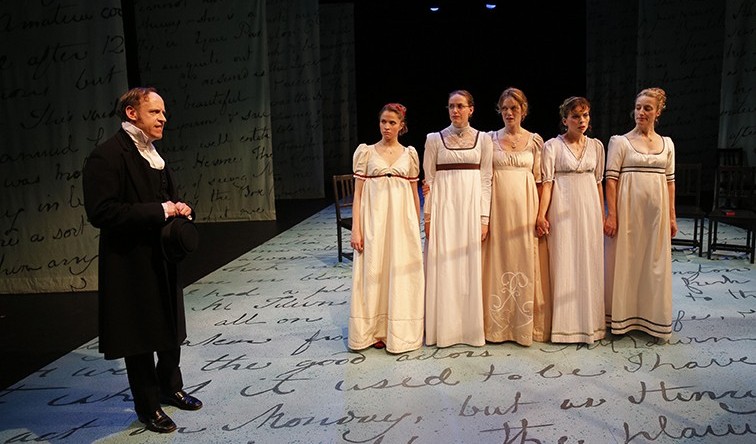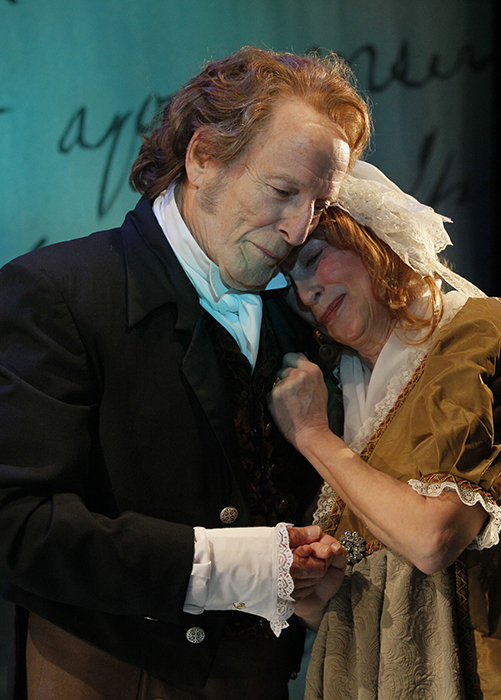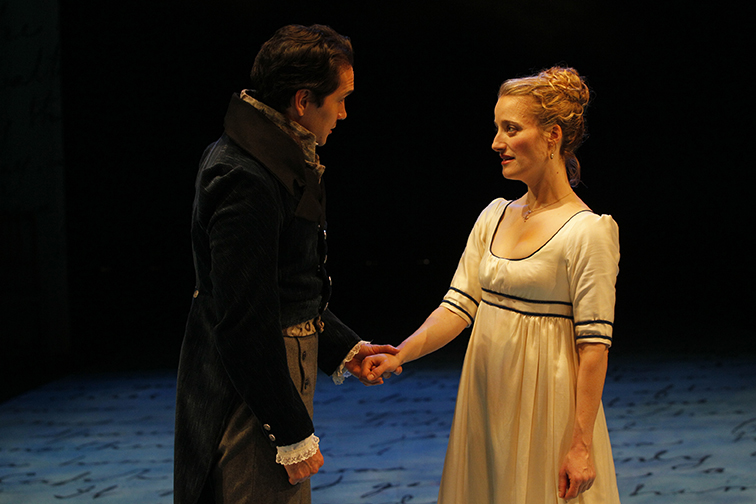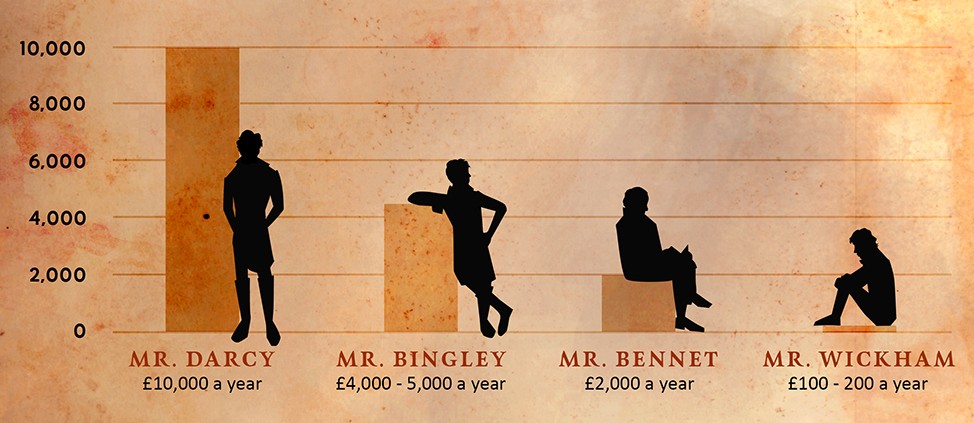Pride and Prejudice is on stage at Book-It, now through December 28. Dramaturgy by Anthea Carns.

In a society where single women had few legal rights of their own, it’s little wonder that the Bennet sisters and their peers have matchmaking on their minds.
In Austen’s lifetime, a smart match was the goal for almost every young gentlewoman. It was in part an economic imperative: few unmarried women had any prospect of being able to support themselves without help from a male relation. A well-off husband meant financial security and comfort for most women. Inheritance laws were such that hardly any young women were in a position to inherit the entirety of a fortune, and any young lady who did inherit a large sum was sure to have suitors buzzing about her immediately. Moreover, unmarried women were expected to live with their families or guardians, no matter their fortunes. With the respectability of marriage came some measure of freedom.

Marriage was a desirable state for young men as well, of course, particularly those not of large fortune, and for single wealthy men, marrying and producing a legitimate heir would ensure that their fortune—along with any lands or hereditary titles—would stay within the family.
Love was not considered a necessity for a marriage in the Regency era. It might develop, over the years, but it needn’t exist beforehand. Attitudes were changing in Austen’s lifetime, however. The Enlightment of the 18th century had introduced the philosophy of “the pursuit of happiness;” one outgrowth of this was the idea that marriage should be a place of happiness and affection, as well as economic stability.
Austen herself was very conscious of the practical reasons for marriage. More than once, her characters, male and female, voice sensible arguments in favor of marrying for security. In 1796, Austen had a close relationship with her “Irish friend,” Tom Lefroy, but family obligations and finances made a match impossible. But when a very good match proposed to Austen in 1802, she refused him, unwilling to wed where she did not love. Later, her niece Fanny wrote to her for relationship advice and Austen told her:
[quote]And now, my dear Fanny, having written so much on one side of the question, I shall turn round and entreat you not to commit yourself farther, and not to think of accepting him unless you really do like him. Anything is to be preferred or endured rather than marrying without affection…[/quote]
Austen’s heroines often wrestle with the same dilemmas: should security come before love, or vice versa?
And if a young lady and a gentleman should find themselves fond of one another—what came next? How would they go about making their feelings known?
Of course, there were expectations for carrying on a courtship, which mostly consisted of a long list of things one was not supposed to do. Too much personal correspondence between unmarried men and women was considered improper. Too much familiarity was frowned upon: the lady and her beau were not supposed to address one another by their first names. Too much time spent together unchaperoned, outside socially acceptable settings such as dances or walks, would be inappropriate at best. And showing too much enthusiasm was not to be thought of: a lady should be pleasant to the man she admired, but never more affectionate or demonstrative than decorum allowed.
Somehow, in spite of all these strictures, couples communicated their feelings for each other. Once a gentleman felt fairly certain of the answer, he could make the proposal of marriage. He was expected to seek the lady’s father’s consent at some point, but it was perfectly acceptable for him to speak to the lady first. Once all parties involved had agreed, and the business details of the lady’s dowry, the gentleman’s marriage gift, her pin money, and so forth had been settled, the upcoming wedding would be announced for three consecutive weeks at the local church, a practice called “reading the banns.”

For those in a real hurry, with little money or care for their reputations, eloping was always an option. While English law required parental consent and the reading of the banns before a couple could wed, Scottish law required only that both participants be consenting, and have a witness to the union. The town of Gretna Green, just over the Scotland-England border, thus became a popular destination for eager couples. An elopement of this kind would certainly cause a scandal, particularly in aristocratic families—but the wedding would be legally binding, and the couple bound to each other, even if their marriage had begun in less than ideal circumstances.
What was the ideal marriage, then—the fairy tale that the Bennet girls might dream of? The gentleman and the lady should be of the same social class; their families should both be respectable, and between the two of them their wealth should be enough to keep them comfortable; their courtship and marriage should be conducted with decorum. Meet all those requirements, and your marriage might fairly be called “ideal.”
But to all this, add love, and you might truly have the makings of a Regency fairy tale ending.
Just How Rich is Mr. Darcy?
It’s hard to make an exact comparison between Georgian currency and today’s currency, but £1 in 1813 would have roughly the same buying power as £60 today. With the current exchange rate, that’s about US$95, which makes Mr. Darcy’s annual income almost $1,000,000! (Source: Bank of England’s inflation calculator)
£400 a year
An income that approaches the comforts of genteel life. It usually brings a cook, a housemaid and, perhaps, a boy.
£500 a year
This sum, according to domestic economists, fills the cup of human happiness. It would allow for three servants, but no horses or carriage.
£700 to £1,000 a year
This higher range of upper professional incomes marks the most prosperous pseudo-gentry families. Its most significant consumer marker was the ownership of a carriage.
£2,000 a year
At this level we have the landed gentry however, domestic economy must still hold a tight rein, especially when, as with Mr. Bennet in Pride and Prejudice, there were five daughters to marry off!
Above £4,000 a year
Incomes of £4,000 a year and above (Darcy’s, Bingley’s, Crawford’s, Rushworth’s) leave behind the “cheese-paring” cares of middle-class incomes, to enter a realm of unlimited genteel comforts. To spend more than this, according to contemporary wisdom, “a man must go into horse-racing or illegitimate pleasures.” (Landowning as a Business 1882).
